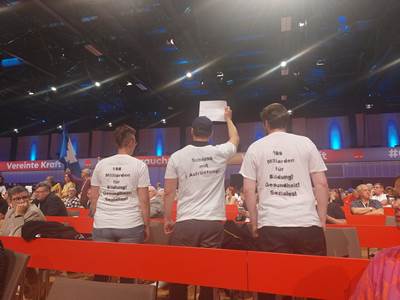
From 17 to 23 September, about 1,000 delegates at the ver.di national congress will discuss the future direction of the trade union. Ver.di is a public and service sector union and the second biggest in Germany with just under two million members. The main motions on the table are intended to intensify the cooperation with the so called ‘traffic light’ government (the coalition of social democrats, Greens and liberals). But there is also protest amongst delegates.
In the face of high inflation, this spring we saw the largest mobilisations in ‘warning strikes’ for a long time and 130,000 new members joining ver.di. However the motions passed at the trade union’s council (its second highest body after the national congress) make no reference to this. Yet it would be important to start precisely here in order to pick up on the developing readiness to fight. There is a lot of talk about crises and challenges. However, the ver.di leadership sees itself above all in the role of “co-creator” in cooperation with a government whose policies it basically supports and where only individual improvements are to be proposed.
“Co-creation” instead of resistance
The imminent dangers of a recession and the associated job losses, attacks on working time and pensions, as well as on the right to strike, are also mentioned at most in passing. But it is not said that a broad mobilisation is needed against this – a coordination of collective bargaining movements and pooling of strike days in order to strengthen the common fighting force. In many places, the current ‘traffic light’ government is given a good report card, such as in Motion C001 on “socio-ecological restructuring”: “In response to the pandemic and the energy crisis, the state has demonstrated its great capacity to act – from enormous spending programmes to publicly funded services, legal requirements to nationalisation.” There is no criticism of the measures to make many sections of the working class pay, as in the heating bill.
War support
A motion of the union’s council also aims to close ranks with the government on the question of war and peace. This overturns previous peace policy resolutions. In this motion, all measures taken by the federal government and NATO – from sanctions to arms deliveries to Ukraine – are considered correct. It is good that an appeal has been launched against this motion under the title “Say No” and this should be widely supported. Based on this, it should be stated that opposition to the Russian invasion is not synonymous with support for the Ukrainian oligarch government and the NATO countries supporting it, but an independent class position should be taken.
Networking critics
Based on the experiences in the collective bargaining rounds, a number of workers in different cities have expressed interest in systematic networking in ver.di in order to work together for a militant orientation and democratic structures. The existing “Network for a militant and democratic ver.di” is to be restructured and expanded. During the national congress, material from the network was distributed and supporters participated in a protest during the speech of chancellor Olaf Scholz to the congress. Two Sol members from Berlin are delegates to the congress and have intervened in the general debate on the second day of the congress, demanding a clear anti war position, a combative policy of the trade union and an end to social partnership.
